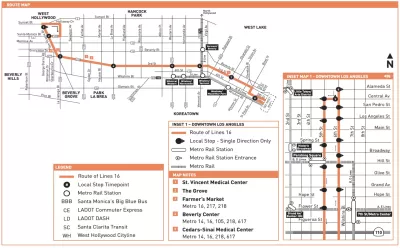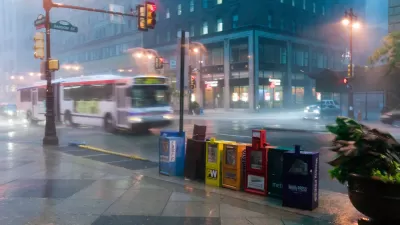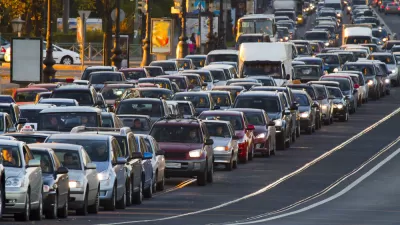Los Angeles’ 16 bus, which cuts across the city on Third Street through some of the city’s densest neighborhoods, will experiment with a new approach to service design.

The Los Angeles County Metropolitan Transportation Authority (Metro) bus system is switching to “headway-based operation” to improve performance along a popular east-west route. The Metro 16 bus will operate without a schedule between 7 am and 5 pm on weekdays.
According to an article by Daniel Martinez for LAist, headway-based operations differ from Metro’s standard timetable bus service design schedule by focusing on the spacing between buses (i.e., headways), rather than a set schedule of departure and arrivals.
Martinez also explains how headway-based operations work in an era of real-time location technology:
Thanks to advances in technology, supervisors will monitor the intervals at departure, in the middle of the line, and at the end of service. Additionally, bus operators will have tablet displays that provide real-time feedback on when their pacing is good, when to slow down to increase the gap between buses, and when to speed up to avoid bunching.
Headway based operations can thus mitigate bus bunching—when several buses can pass in quick succession, leaving a longer-than-planned gap between headways.
“Similar headway based programs had been tried in other large cities like Honolulu, Austin, and Seattle,” according to Martinez, but Metro scrapped its own previous attempt at headway-based operations with the launch of rapid service back in the early 2000s.
FULL STORY: Can Buses Run More Efficiently Without A Schedule? Metro Wants To Test It Out

Alabama: Trump Terminates Settlements for Black Communities Harmed By Raw Sewage
Trump deemed the landmark civil rights agreement “illegal DEI and environmental justice policy.”

Study: Maui’s Plan to Convert Vacation Rentals to Long-Term Housing Could Cause Nearly $1 Billion Economic Loss
The plan would reduce visitor accommodation by 25% resulting in 1,900 jobs lost.

Planetizen Federal Action Tracker
A weekly monitor of how Trump’s orders and actions are impacting planners and planning in America.

Waymo Gets Permission to Map SF’s Market Street
If allowed to operate on the traffic-restricted street, Waymo’s autonomous taxis would have a leg up over ride-hailing competitors — and counter the city’s efforts to grow bike and pedestrian on the thoroughfare.

Parklet Symposium Highlights the Success of Shared Spaces
Parklets got a boost during the Covid-19 pandemic, when the concept was translated to outdoor dining programs that offered restaurants a lifeline during the shutdown.

Federal Homelessness Agency Places Entire Staff on Leave
The U.S. Interagency Council on Homelessness is the only federal agency dedicated to preventing and ending homelessness.
Urban Design for Planners 1: Software Tools
This six-course series explores essential urban design concepts using open source software and equips planners with the tools they need to participate fully in the urban design process.
Planning for Universal Design
Learn the tools for implementing Universal Design in planning regulations.
Caltrans
Smith Gee Studio
Institute for Housing and Urban Development Studies (IHS)
City of Grandview
Harvard GSD Executive Education
Toledo-Lucas County Plan Commissions
Salt Lake City
NYU Wagner Graduate School of Public Service





























